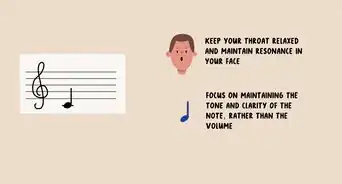This article was co-authored by Annabeth Novitzki. Annabeth Novitzki is a Private Music Teacher in Austin, Texas. She received her BFA in Vocal Performance from Carnegie Mellon University in 2004 and her Master of Music in Vocal Performance from the University of Memphis in 2012. She has been teaching music lessons since 2004.
There are 15 references cited in this article, which can be found at the bottom of the page.
wikiHow marks an article as reader-approved once it receives enough positive feedback. This article has 21 testimonials from our readers, earning it our reader-approved status.
This article has been viewed 1,062,470 times.
You might sound like a rock star in the shower or the car, but it can be difficult to tell if others think you sound as good as you do. As it turns out, you can find out whether or not you've got a good set of pipes by learning to listen to yourself correctly. Record your voice and listen back for things like your tone, pitch, and vocal control. The good news is, almost anyone can be taught to sing well, and you need only follow a few simple steps to improve your voice.[1]
Steps
Evaluating Your Vocal Technique
-
1Find your vocal range. To give yourself the best shot possible when evaluating your singing voice, you first need to find your vocal range. There are a number of apps and websites with rangefinder tools that can help you determine your natural range in a matter of minutes. You can also find your vocal range by recording and listening to yourself as you sing.[2]
- If you use an app to find your vocal range, you will be directed to record your voice using your phone's microphone. Depending on the app, you may be able to record anywhere from 30 seconds to 3 minutes, generally singing the song of your choice. The app will then take the median frequencies of your voice to give you your general range.
- Vocal ranges can be broken up into voice types. From highest to lowest, the voice types are soprano, mezzo-soprano, contralto, countertenor, tenor, baritone, and bass.
- Each voice type also has subcategories, such as lyric and dramatic, to help better characterize individual vocal abilities.
-
2Choose a song in your vocal range to record. Once you know your range, look for a song that matches your voice type for you to record. Singing a cappella (without accompaniment) isn't the best way to figure out if you have a good singing voice, so look for a song with a backing track or provide accompaniment for your tune.[3]
- It's important to give yourself a guide track, like a blank karaoke track, to find out whether or not you can match tones and stay in tune while you're singing. Blank karaoke tracks are readily available online through sites like YouTube.
- You can also check out the pre-programmed tracks on Casio keyboards, or the instrumental version of songs from albums you might have.
- Before you record, play around with songs in a few different keys. Find one that feels comfortable for you.
Advertisement -
3Record your voice. Your sinus cavities make your voice sound different in your head than it sounds to others. This means that to get an idea of how well you sing, the best way to hear yourself is through a recording. Use a voice recorder or the recorder app on your smartphone and sing at least 30 seconds of a tune.[4]
- While it’s not necessary to invest in fancy recording equipment to listen to yourself, you do want to make sure you’re using a quality recorder. If the recording app on your phone makes others’ voices sound weird, it will probably distort yours, too.
- If you're nervous about singing in front of others, this is a great way to get around the performance anxiety. Nobody needs to hear your recording but you.
- Note that professional singers record themselves to help improve their tone![5]
-
4Listen to the playback and note your gut reaction. This is your moment of truth! After you've finished your recording, take a deep breath and press play. During your first listen, pay attention to how well you move through the song and your gut reaction when listening to your voice. Your instincts aren’t perfect critics, but they can tell you a lot.[6]
- Listen to the track in a variety of ways. Check it out on your cheap computer speakers, then plug the track in and listen to your car speakers, then check it out on headphones. Different qualities and types of speakers will give you different results.
- People are often their own worst critics. A gut reaction is important, but it should also be paired with further evaluation to help counter your more critical instincts.
-
5Pay attention to how well your voice can match the pitch of the backing track. After your initial listen, play your recording again and look for vocal control. Listen to make sure you are on key. This means that your voice should match the pitch of the backing for the song.[7]
- During this listen, you should also be wary of things like your voice cracking or unintentionally wavering. This can be a sign that you’re over-extending your vocals or that you don’t have full control of your range.
-
6Check your breathing to make sure you can't hear it as you sing. Controlling your breathing may not seem like much, but it has a huge impact on how well you sing. Listen to your recording again to see if you can hear yourself deeply inhaling as you sing. Also listen for things like notes getting cut short because you ran out of breath, or your tone getting unusually high right before you inhale.[8]
-
7Critique your overall tone and timbre. Timbre is your voice’s overall characteristics. Even if you’re singing all the right notes, if your tone is off or your timbre mismatches your song, it may still sound bad. Listen for things like how much you clearly and consistently emphasize vowel sounds, how much of your vocal register you can reach, and how much rhythmic nuance your voice imparts (how well you can match your voice to different styles of singing).[9]
- As you evaluate your timbre, pay attention to whether your voice is hard or soft, hoarse or smooth, light or heavy, etc.
Improving Your Singing
-
1Try audiation. Listen to a short melody or a pitch, then imagine that melody or pitch inside your head without making any sound. Next, imagine yourself singing the pitch or melody, but stay silent. Finally, sing the pitch or melody out loud.[10]EXPERT TIPAnnabeth Novitzki is a Private Music Teacher in Austin, Texas. She received her BFA in Vocal Performance from Carnegie Mellon University in 2004 and her Master of Music in Vocal Performance from the University of Memphis in 2012. She has been teaching music lessons since 2004.Music Teacher

 Annabeth Novitzki
Annabeth Novitzki
Music TeacherAnnabeth Novitzki, a private voice teacher, notes: "While some people have more natural talent for singing, it is a skill that can be worked on and improved. If you're passionate about singing, train wisely and regularly to improve your voice."
-
2Practice your range and technique every day. While some people have naturally better vocal control than others, every singer can benefit from practicing. Continue working on controlling your breathing, honing your pitch, and finding a musical style that matches your voice’s natural timbre.[11]
- Musical talent often develops side-by-side with musical aptitude. Start studying vocal techniques and learning about the voice as an instrument. The more you know about what goes into singing, the more you get out of your practice.
-
3Take voice lessons. Having someone to teach you how to use your voice as an instrument can make a big difference in how well you sing. Choose an instructor who focuses not only on your pitch, but on helping you improve your overall technique. A good vocal coach will teach you not only how to hit notes, but how to stand, breathe, move around, read music, etc. while you sing.[12]
- If you have any friends taking vocal lessons, ask them who they train with to get some recommendations. Choir teachers, local bands, and local a capella groups may also have some good references for vocal coaches.
- Many vocal coaches will let you take an introductory lesson for free or for a discounted fee. Sign up for intro lessons from a few coaches to get an idea of who will work best with you. Did the coach encourage you to sing? Did they spend most of the lesson talking? Did they focus on just your voice, or on your physical technique as well?
-
4Learn to take constructive criticism. If you have a wonderful singing voice, you will know it by now. If not, you'll likely also know it. But, just as a guitar player has to go through an awkward period of fumbling over the strings, singers have to work hard at singing to improve their voices. It's not something that you're born with. It's something you can work on with dedication and practice.[13]
- If someone tells you that you can't sing, but you've got a passion to work on your voice, then continue practicing and working hard to get your voice improved. Don't listen to the noise. Even so, some people can just never sing no matter how hard they practice. You should already know if this is you.
-
5Join a school or community choir to get training and practice your vocals. Singing as part of a choir is an excellent way to help improve your singing. You'll get feedback from the choir director and the other members of the choir, and you’ll have the chance to work as part of a team. Untrained singers often feel more comfortable in these teams, as it allows them to sing without their voice being singled out for criticism.[14]
- Singing the same voice part with others can improve your pitch recognition and even help you learn to sing more complex melodies.
- Talk with the choir director about ways to increase your singing ability.
- In addition to helping you sing better, group singing is often linked to jump-starting social bonds and improving your overall mood.
-
6Continue to train and practice regularly to improve your singing technique. If you've concluded that you don't have natural singing ability, but you love to sing, keep working at it. Your instructor will be able to help you make the most of the vocal chords you were born with. The joy of singing is available to everyone who wants it.[15]
Using Tools to Check Your Natural Ability
-
1Take a tone-deaf test. Tone deafness is a condition wherein some people aren't able to properly perceive the pitch of a given sound. There are several tone-deafness tests available online that can help you figure out if you struggle to perceive and match tones.[16] Find out if you can distinguish between low and high notes, or if you're part of the 1.5% of the population with "amusia" who cannot differentiate pitch, tone, and even rhythm.[17]
- Most online tone deafness tests consist of several short clips from well-known songs or tunes. Listen to the clip, then indicate on the test form whether or not it was played correctly.
- Tone deafness does not mean you have an inherently bad voice, but it can indicate that you struggle to match your voice to the tune of the song you’re singing.
- Likewise, struggling to control your singing voice does not mean you’re tone deaf. There are a lot of factors that contribute to being a good singer, and it may be that you simply need to work more on honing vocal control.
-
2Ask for a second opinion from people you trust. Just like singing for friends or family, playing your recording back for a few trusted people can help you get insight into what others think of your singing. If you have a friend who is a strong singer, ask them for more technical critiques. If your audience doesn’t have a strong singing background, ask them for their initial reactions.[18]
- Pick people who you trust to give you honest feedback. Don’t look for someone you know will tell you that you’re great no matter what, and don’t trust someone who is prone to tearing you down even when you’re doing well.
-
3Perform for others to get an outside opinion. If you’re looking for constructive feedback from others, try singing to an audience. Ask your friends or family to sit down for a small concert. Go to an open mic night at a club or lounge, sign up for a talent show, or do karaoke. Just find a venue where you’re comfortable and give it a go.
- Pick a room that will help you present your voice at its best. A large room with high ceilings will make your voice sound better than a carpeted basement with low ceilings will.
- When your performance is finished, ask your audience to give you an honest opinion. Remember that some individuals may try to spare your feelings, while others are hyper-critical. Look for an average consensus rather than taking any one opinion too hard.
- Another way to get feedback from the public is by busking in a train station or in a busy shopping area. If you can, set up a microphone and a small amplifier and see if people will stop to hear you sing. Just make sure you have all necessary permissions from whoever owns or regulates the property first. Some areas, such as subway stations, may require city permits.
Expert Q&A
Did you know you can get premium answers for this article?
Unlock premium answers by supporting wikiHow
-
QuestionHow do you sing beautifully?
 Annabeth NovitzkiAnnabeth Novitzki is a Private Music Teacher in Austin, Texas. She received her BFA in Vocal Performance from Carnegie Mellon University in 2004 and her Master of Music in Vocal Performance from the University of Memphis in 2012. She has been teaching music lessons since 2004.
Annabeth NovitzkiAnnabeth Novitzki is a Private Music Teacher in Austin, Texas. She received her BFA in Vocal Performance from Carnegie Mellon University in 2004 and her Master of Music in Vocal Performance from the University of Memphis in 2012. She has been teaching music lessons since 2004.
Music Teacher
-
QuestionCan everyone can sing?
 Annabeth NovitzkiAnnabeth Novitzki is a Private Music Teacher in Austin, Texas. She received her BFA in Vocal Performance from Carnegie Mellon University in 2004 and her Master of Music in Vocal Performance from the University of Memphis in 2012. She has been teaching music lessons since 2004.
Annabeth NovitzkiAnnabeth Novitzki is a Private Music Teacher in Austin, Texas. She received her BFA in Vocal Performance from Carnegie Mellon University in 2004 and her Master of Music in Vocal Performance from the University of Memphis in 2012. She has been teaching music lessons since 2004.
Music Teacher
-
QuestionCan everyone sing?
 wikiHow Staff EditorThis answer was written by one of our trained team of researchers who validated it for accuracy and comprehensiveness.
wikiHow Staff EditorThis answer was written by one of our trained team of researchers who validated it for accuracy and comprehensiveness.
Staff Answer wikiHow Staff EditorStaff Answer
wikiHow Staff EditorStaff Answer
References
- ↑ https://qz.com/quartzy/1289153/almost-anyone-can-and-should-learn-to-sing/
- ↑ http://www.bbc.co.uk/sing/learning/voice.shtml
- ↑ https://takelessons.com/live/singing/what-key-should-I-sing-in-z02
- ↑ https://takelessons.com/live/singing/what-key-should-I-sing-in-z02
- ↑ https://www.ncbi.nlm.nih.gov/pubmed/26186810
- ↑ https://www.nytimes.com/2017/01/13/science/recorded-voices.html
- ↑ https://www.ludwig-van.com/toronto/2017/10/24/feature-think-you-cant-sing-science-doesnt-believe-you/
- ↑ https://www.nidcd.nih.gov/health/taking-care-your-voice
- ↑ http://news.wbfo.org/post/online-singing-test-gauges-accuracy-pitch
- ↑ https://giml.org/mlt/audiation/
- ↑ https://news.psu.edu/sites/default/files/research/image/5431.jpg
- ↑ https://www.ludwig-van.com/toronto/2017/10/24/feature-think-you-cant-sing-science-doesnt-believe-you/
- ↑ https://www.forbes.com/sites/dailymuse/2012/11/07/taking-constructive-criticism-like-a-champ/#7d4e85622c0c
- ↑ https://greatergood.berkeley.edu/article/item/science_of_singing
- ↑ http://news.wbfo.org/post/online-singing-test-gauges-accuracy-pitch
- ↑ https://www.nidcd.nih.gov/tunestest/take-distorted-tunes-test
- ↑ https://qz.com/quartzy/1289153/almost-anyone-can-and-should-learn-to-sing/
- ↑ https://www.theguardian.com/culture-professionals-network/culture-professionals-blog/2012/feb/09/reasons-tips-criticism-arts
- ↑ https://www.economist.com/science-and-technology/2014/07/05/practice-may-not-make-perfect
About This Article
To know if you can sing, try taking an online tone-deaf test to see if you struggle with pitch, tone, and rhythm. You can also try asking a friend or family member you trust to listen to your singing voice and give you their honest opinion. Or, if you want even more constructive feedback, consider performing at an open-mic night, talent show, or karaoke bar. If you're nervous about singing in front of other people, try recording yourself singing and then listening to it to see if you like the way you sound. To learn how to improve your singing voice, scroll down!















-Step-5-Version-2.webp)




















-Step-5-Version-2.webp)






































